by Frank van Steenbergen

New days are coming – they will always come.
Every day is a time to change – to abandon fear, prejudice, guilt, animosity. But the New Day that marks the beginning of spring is a special turning point. Such is the essence of Nav Rov (which means ‘New Day’), the celebration of revival and reinvigoration with an uninterrupted four millennium history, in Iran, Central Asia and surrounding regions.
Nav Roz coincides with the ‘vernal equinox’ – which happen twice a year, when the Earth’s axis is not tilted toward or away from the sun, resulting in nearly equal periods of daylight and darkness. In the Northern Hemisphere it marks the spring; in many countries the start of the solar calendar, developed by astronomers more than seven millennia ago.
Nav Roz is celebrated with the cleaning of the house, the burning of unnecessary things, the release of organic manure that was stored over the winter. Windows that were closed are opened. It is also the time to cherish the blossoms, that as all good plans and intentions, come before the leaves and the actual action.
The New Day is the holiday of revival of Nature as well as of the Spirit. Before Nav Roz, one has to repent one’s sins, reconcile with enemies, and forgive debts. It is believed that when Nav Rov comes, the kind angels bring abundance and prosperity to those, who have pure thoughts, clear minds, and clean homes.

On the day itself traditionally families come together and gather at a special table. A mirror is placed on the tablecloth, reflecting the past and the future. Seven special dishes (haft-sin) adorn the table: sabzeh, a plate with sprouted wheat or lentils representing rebirth and renewal; samanu, a sweet dish made from wheat germs, symbolizing affluence, and fertility; senjed, dried red dates, representing love and affection; sir, garlic that stands for medicine and health; seb. apples representing beauty and health; sumac, the red tangy spice, similar to the color of sunrise, signifying the victory of good over evil; and finally, serkeh, vinegar representing age and patience.
In parts of Central Asia, such as Tajikistan, the beginning of the farming season is celebrated with a special ‘agricultural’ Nav Roz, called juftbararan. It starts in the morning with cleaning the irrigation canals and ditches, so they can receive water. Then farming community then comes together and the most elderly and experienced farmer brings wheat grains, which he has collected in the hem of his coat. A prayer is made to increase the harvest and with collective blessing the seeds are placed in the earth. A pair of bulls is brought forward, and the first furrow is made, celebrated with songs and dances.
It seems that these days – more than ever – we need these New Days, as we have a world obsessed with enemy and security thinking, division, blindness to injustice, and the admiration for extreme wealth, rather than peace and gratitude for what the Creator and Creation bring us. We need a big Nav Rov with Holy Weeks to follow and reconsider the patterns that we have become stuck into.
To celebrate Nav Roz, here is a link to a beautiful song: https://www.youtube.com/watch?v=sY1GmQj0cjs



